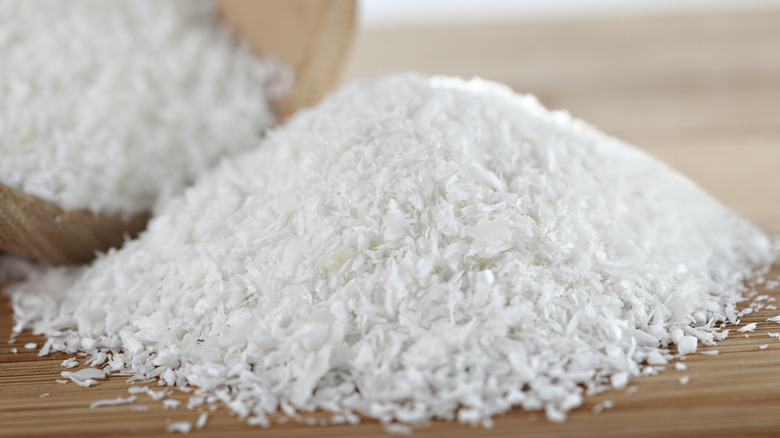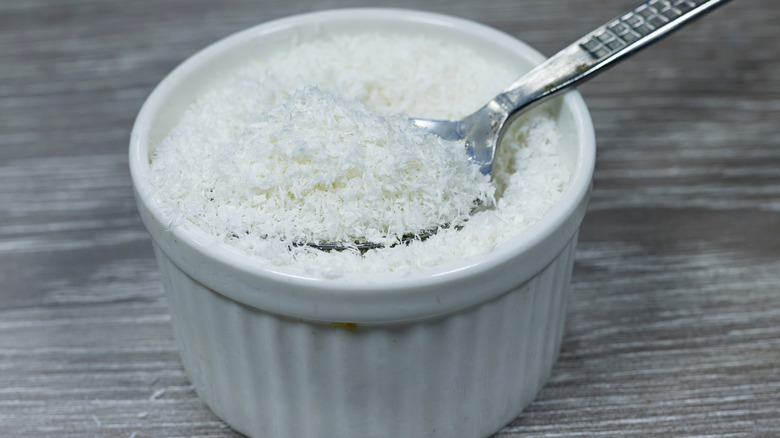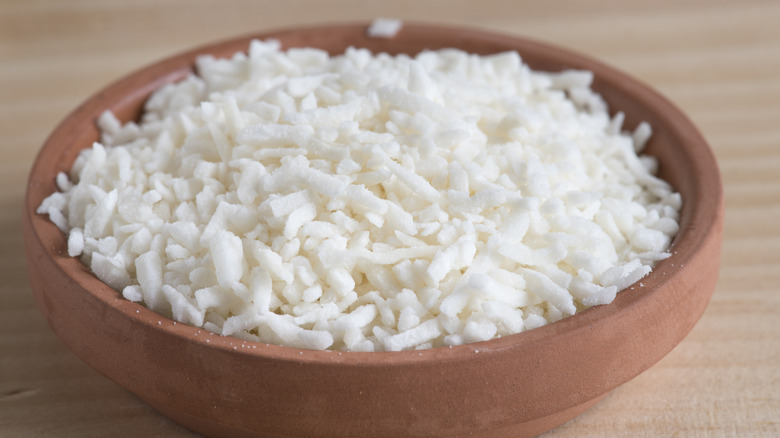Desiccated Vs Shredded Coconut: Is There A Difference?
Coconut lovers, rejoice; or perhaps, pause for a moment of reflection. If you've ever wandered down the baking aisle and found yourself face-to-face with two similar-sounding options — desiccated coconut and shredded coconut — you might have asked yourself: Are they really that different? And should I just learn how to open a coconut without hurting myself instead? The short answers: yes, and up to you, but when it comes to the first question, it depends on how you're planning to use them. Both forms of coconut bring their unique charm to recipes, but they're not interchangeable in every case.
Desiccated coconut is finely ground and thoroughly dried, perfect for recipes where moisture isn't welcome, like macarons or homemade coconut flour. On the other hand, shredded coconut is all about texture, with long, thin strips that retain a bit more moisture and chew, ideal for topping baked goods or making classic coconut macaroons (which are not the same as macarons). Knowing when to use each can take your coconut game from basic to brilliant.
Let's crack open this nutty debate and figure out exactly how desiccated and shredded coconut differ, how they're made, and which recipes make them shine. Spoiler: There's no wrong answer when coconut is involved, just a bit of sweet culinary strategy.
Desiccated coconut: finely ground and flavorful
Desiccated coconut is the minimalist of the coconut world, focusing on functionality and versatility. Made by grating fresh coconut meat, pressing out as much moisture as possible, and drying it to a crisp, desiccated coconut is ultra-dry and finely ground. Its crumbly, powdery, barely-there texture makes it a staple for recipes where moisture is the enemy. Macarons, energy balls, and desserts that need a fine, nutty finish all benefit from this type of coconut.
What sets desiccated coconut apart is its ability to absorb flavors. It works beautifully in curries and stews, soaking up spices while adding a subtle nuttiness to savory dishes. In baking, desiccated coconut evenly distributes coconut flavor without adding extra texture, making it a great choice for cakes or cookies where chewiness isn't the goal. If stored in a cool, dry location, desiccated coconut can also last up to 12 months, so it's perfect for spontaneous baking inspiration after watching "The Great British Bake Off."
Desiccated coconut can be rehydrated by soaking it in water or milk (coconut water and coconut milk are recommended), making it an excellent substitute for fresh coconut in recipes. It's a true multitasker for global cuisines, from sweet treats to savory dishes. So, whether you're learning how to use it in Thai-inspired cuisine like coconut rice, or dusting a cake with coconut snow, desiccated coconut is your dry and dependable ally. Desiccated coconut may not have the drama of its shredded cousin, but its adaptability makes it a workhorse in any kitchen.
Shredded coconut: all about texture
If desiccated coconut is all about functionality, shredded coconut is here to bring texture and drama to the table. Made by grating fresh coconut into long, thin strips, shredded coconut is slightly coarser and holds onto more moisture than its finely ground cousin. This gives it a chewy texture that's perfect for adding bite to your recipes. It comes in flakes and shreds, and though it's important when to use each, they are both delicious.
Shredded coconut comes in both sweetened and unsweetened forms. Sweetened shredded coconut is a star player in desserts like coconut cakes, cookies, and muffins, balancing their softness with a chewy texture. The unsweetened version finds its place in savory dishes, adding both crunch and a tropical twist to curries, salads, or granola. And if you toast shredded coconut in the oven, you'll unlock an even richer, nuttier flavor that can top just about anything, whether it's sprinkled over oatmeal or layered into a curry. Shredded coconut is the playful counterpart to desiccated coconut's precision and versatility.
Ultimately, while both desiccated and shredded coconut work in a variety of dishes, knowing the differences will help you make the most of their unique qualities. Desiccated coconut is your go-to for moisture-free, flavor-absorbing perfection, while shredded coconut delivers texture, chew, and flair. Whether you're baking, cooking, or just topping off a dish, there's a coconut for every culinary occasion.


